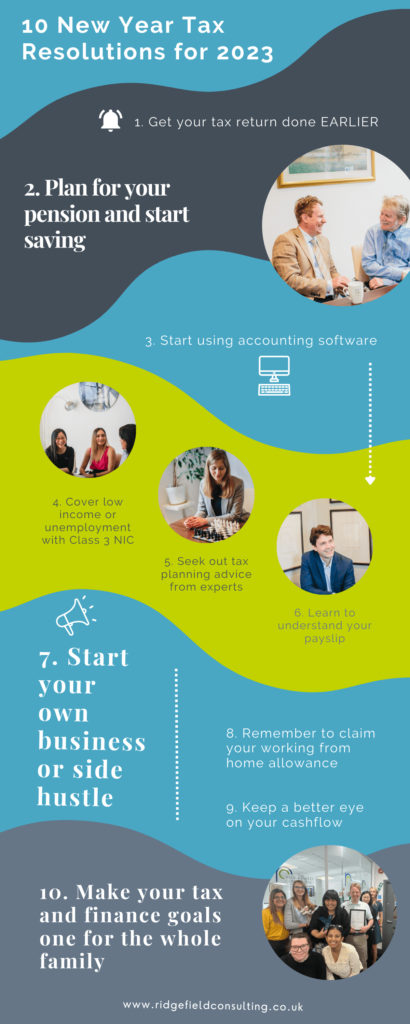10 New Year Tax Resolutions for 2023

10 New Year Tax Resolutions for 2023
1. Get your tax return done earlier
2. Plan for your pension and start saving
3. Start using accounting software
4. Cover low income or unemployment gaps with Class 3 National Insurance contributions

If you’re discovering this article during the festive holiday period, take this as a sign! If you’re not, then there’s still time to put these 10 New Year resolutions in place to help improve your tax position and save on tax. Improving one’s finances, financial health, or even just staying on top of your money a bit better is one of the most common new year resolutions, but few people look at what they can do when it comes to their taxes which can make a big difference.
We’ve set out 10 New Year tax resolutions for you to take on in 2023 that are straightforward and achievable.
1. Get your tax return done earlier
This one was always going to make it to the top of the list. If you are guilty of leaving your tax return to the last-minute year after year, then 2023 is the year to kick that bad habit. Not only is it not worth the stress, but there are actually many ways you could benefit by completing your tax return as early on in the tax year as you can. Getting organised and completing your tax return early can really make an impact on your overall finances because you’ll know exactly how much your tax bill will be so that you can budget for that expense over the course of the year. The tax return deadline always falls on the 31st January – straight after Christmas and New Year – so it’s already an expensive time of the year where you don’t need to be under pressure to find more funds to pay your tax bill. Bear in mind that you cannot pay your tax bill on a personal credit card. You can pay through a corporate credit card but there are additional fees for doing so.
2. Plan for your pension and start saving
Planning for the future is always a task that can be left to another day but for a New Year tax resolution, aim to at least map out how much you will need for retirement and then break down how long it will take you to save that amount. Did you know that the average retirement pot requires around £366,000 and yet over 66% of workers retiring in 2021 were at risk of running out of money due to not having enough saved? Your pension may seem like an issue that is too long away to start considering, but the earlier you start to save for it, the more likely you are to have saved enough once you’re ready to retire. Not only that, but again, there are tax benefits to saving into a pension fund from receiving a government top up to increasing your basic rate income tax band if you are a higher rate or additional rate income taxpayer.
3. Start using accounting software
This is definitely a challenging New Year resolution, but significantly important. If you’re a VAT registered business, then you’ll be familiar with Making Tax Digital (MTD) already and may even be using accounting software to do your bookkeeping. If you’ve been leaving this to your accountants, then this could be the year you decide to take things into your own hands. You can still rely on your accountants to help you with your tax return or VAT returns, but you may find that providing your bookkeeping records via access to your accounting software could reduce your accountancy fee.
If you’re not VAT registered, but still run your own business as a sole trader then this should still be a goal for you in 2023. This is because MTD will move into the next phase by April 2026 (delayed from 2024) which will require you to keep all records of your income and expenses electronically and submit a personal tax return quarterly through HMRC-approved software. It may seem like a way off, but it’ll creep up quick and you never know when HMRC will change their minds and bring MTD forwards. Therefore, you’re better off getting to grips with accounting software sooner rather than later. Not only that, but you may well find that it’ll make your bookkeeping much more efficient.
4. Cover low income or unemployment gaps with Class 3 National Insurance contributions
Paying your National Insurance (NI) may not sound like something that needs to be a priority as NI is mandatory for anyone over the age of 16 earning at least £183 per week. It’s automatically taken care of if you are employed or charged at fixed rates depending on your profit if you are self-employed. If you are a director of your own limited company then you will have more scope to minimise your NI payments through a combination of a director’s salary and dividends.
However, if you have been unemployed for long periods (such as going on maternity leave or sick leave) or not earning enough to reach the threshold, then these will be marked as gaps in your NI contributions. It may mean that you won’t be eligible to receive all state benefits such as the full state pension. Therefore, you may want to consider whether it would be worthwhile for you to make voluntary NI contributions, also known as Class 3 NI, to fill in any gaps.
5. Seek out tax planning advice from experts
If you’re serious about improving your finances in 2023 then it would be wise to not only see a financial advisor, but a tax advisor as well. Minimising your tax by using as much tax relief and allowances as possible goes hand in hand with increasing your wealth. Many people disregard readily available tax relief opportunities such as claiming child benefits because it may not seem obviously worthwhile to do so, but utilising these tax planning strategies together soon adds up. If you’re disposing of assets, then you may want to speak to an accountant to discuss ways to reduce any potential capital gains tax. Alternatively, if you’re looking to invest then tax-free schemes such as SEIS and EIS could be ones to look into and consider further.
6. Learn to understand your payslip
How often do you look at your payslip? How often do you look at everything on your payslip and not just the amount that you’re due to receive? Whilst you may not pay too much attention to your payslip apart from the key figure, 2023 will be a particularly important year to keep an eye on everything on your payslip. This is because the Chancellor announced that income tax bands will be frozen until at least 2027/28 and means that the personal allowance of £12,570 remains fixed. With the cost of living and inflation rising so rapidly, many employers are doing their best to increase wages in line as much as possible. This could result in you falling into a higher income tax band and not realising it unless you’re paying close attention to your payslip. Learn to understand the most commonly used tax codes so that you can spot when something doesn’t look right.
7. Start your own business or side hustle
There’s never the perfect time to start your own business, so if you’ve been thinking about doing so for a while, then you may as well go for it in 2023. Whether you’re already working as a sole trader and would like to take the next step to form your own limited company, or you just want to test the waters and start your own freelance business on the side then we’re certainly encouraging the entrepreneurship. Starting your own business can be equal parts exhilarating and daunting at the same time, so our advice is to get the best foundations in place. Decide what business structure you want to operate under, find out what registrations you need to complete, and most importantly, mark in your calendar any key tax deadlines. If you need pointing in the right direction on how to get started, then we’re here and happy to help!
8. Remember to claim your working from home allowance
The working from home allowance was introduced when some workers had no choice but to work from home due to the Covid-19 pandemic. It was intended to help people cover additional utility costs as a result of spending more time at home. Whilst many people did claim this tax relief during the pandemic, they have not done so since despite it still being available. Furthermore, there have been no updates from the government yet indicating any intention to end this tax relief scheme so it’s worthwhile claiming each year it remains available. Once again, although it may not seem overly generous and therefore not worthwhile, every opportunity to reduce your tax taken can add up to significant amounts.
9. Keep a better eye on your cash flow
With the UK entering a recession and the expectation that the economy will continue to shrink in 2023, this is the year to manage and improve your cash flow. A healthy cashflow is not only important to businesses but to personal finances as well to ensure you’re able to comfortably afford the growing cost of living – from your mortgage repayments to the cost of fuel for your car. To improve your cashflow you’ll want to minimise spending and outgoing expenses where possible. A good solution to managing your cashflow is to spread out large payments such as your tax bill so you’re not forced to pay for something expensive in one go where you may have other things to pay for at the same time.
10. Make your tax and finance goals one for the whole family
One of the best ways to keep a new year’s resolution is to be held accountable for it. What better way to do this than to involve the whole family? It may sound strange, but you can even get your children involved! All children are also entitled to their personal allowance of £12,570, so if they’re old enough to do a paper round or odd jobs for neighbours then there’s nothing to stop them making some extra money tax-free. If they’re too young for part-time work, then you can still give them a head start with a junior ISA where you can put up to £9,000 into their account tax-free. All earnings made from the ISA are also tax-free.
If you have no children, you can utilise other family tax strategies including Bed & Spouse. As civil partners and married spouses are able to transfer assets to one another tax-free, it can be a useful way to minimise any capital gains tax. Not only that, but if one of you is not fully utilising your personal income tax allowance, then we recommend claiming for marriage allowance.
That concludes our ten new year tax resolutions. Try to complete one or two or take on the challenge of all ten if you can! Let us know how you do. If you’d like to receive our latest articles straight to your inbox then please subscribe to our monthly newsletter.